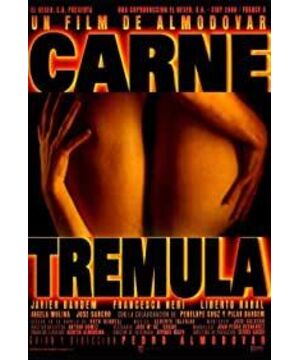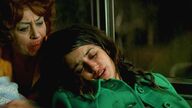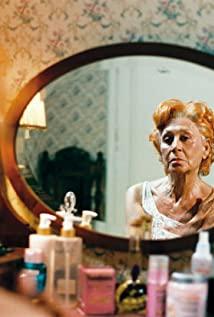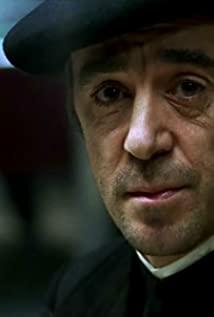What are you seeing? The rich color to death, the desire between every breath, or the desperation of love in surrender to fate, or, you just saw a pure and extreme Almodovar.
A prostitute gives birth to a child representing newborn Spain on a bus, Victor, who becomes a citizen who can ride the bus for free, but the story is irrelevant; Being falsely accused of being imprisoned, he vowed revenge in prison, but the story did not develop towards his revenge. In this way, the film denied the audience's conjecture time and time again, leaving the characters in the story lost in spirit and flesh.
Desire and Love
Almodóvar's films are always filled with inflated desire and love. Born by a prostitute, Victor in "Living Colors" is a vehicle of desire in itself, and when he is mocked by his first woman, Elena, for his youth and innocence, his uncontrollable anger makes him He beat her violently, because he accidentally wounded the police and put him in jail. After being released from prison, he quickly grew into a healthy, strong, kind and sexually experienced man, and Elena, who endured a sexless marriage, saw Victoria Keto's desire for sex was rekindled afterward, not so much the carnal desire brought by Clara or Elena, but the tender flesh that grew into a very attractive male body, in fact , When Elena's husband David had such a perfect male body before he was paralyzed, this is the reason why Clara cheated. Love is always strong without desire, at least in Clara, Sancho has a devastating love for Clara, just like "The Senses World", no matter how hard you pull it, you have to keep it in your own world, Once the infidelity of the other party is discovered, it can only be a lose-lose ending, and the best ending is just like "Tie Me, Tie Me" to make the trapped person suffer from Stockholm Syndrome, and gradually sympathize with the bondage own people.
Almodóvar was certainly open about sex, but he wasn't fighting morality, "'rebellious' is a moral word, and I don't want to break some kind of law, I just want my characters and their actions Present it to the audience." No matter how the director expresses his emotions, it can only be said that he needs to use this form to release his characters, and never use these things as gimmicks, like Quentin, Tim Burton, etc. Very stylized directors just use them to express their stories in the way they are used to.
Religion and Redemption
A very special point of "Living Fragrance" is Victor's worship attitude towards the Bible. Wasn't Victor just like Jesus who suffered for the world? In fact, Almodóvar has involved religious things in every film since his third film "In the Darkness", "About My Mother" Everything" opens with a picture of the Virgin that fills the screen. The use of Catholic portraits conveys a thoroughly and superficial religious thought, and the five women in the story realize the realization through the care between individuals. Redemption of the soul. In "Living Colors", Victor mixed all his favorite photos into the Bible, and it was also the Bible that took him through the hard days in prison. He was redeemed from the Bible and helped him from revenge. On the way to liberation, he was a kind person, and he endured all the sins wrongly imposed on him. Elena's marriage to the cop who helped her - even though this grateful union led to their failed marriage, her transformation from a shaggy-haired drug addict into a good wife is also a redemptive process for the ego . Clara once said, "I will get lost within one square meter." This just shows that she cannot be redeemed in the desire to survive, so her relationship with Sancho will inevitably fall into a doomed situation.
family - missing love
The family in Almodóvar's works is always oppressive and suffocating. The family relationship is only a necessity to build a life together, not a family relationship. The lingering trait: Masochism. In "Fragrance", the family organized by Clara and Sancho and the family organized by Elena and David are deformed, Clara is forced to live with Sancho, and has been coerced by Sancho , Clara is a physical abuser, Sancho is a spiritual abuser, and the asexual marriage composed of Elena and David also makes their family a deformed family, García de Leon commented on Al Modovar said: "Almodovar's films are all maternal films, because the role of father is always a big vacancy." Indeed, not only Victor, who was raised by his mother in "Living Color", In "Talk to Her", Benino, who has been taking care of his mother for 20 years, grew up in the absence of fatherly love, while "All About My Mother" is even more extreme. His father turned into a woman and became a woman. A monster with prosthetic breasts. This special, atypical, and utopian family concept is completely different from the oriental family in Yasujiro Ozu's works. This is not only a difference in the director's personal environment, but also a strong collision between Eastern and Western cultures. The early works of Ang Lee, whose backgrounds from east and west are integrated, often reflect the in-depth thinking of this collision.
sick life
The movies in Almodóvar are always labeled as "extreme" in people's eyes. Whether it is the highly saturated colors in his films or the characters themselves, they all have their own unique souls, and his characters are all wrong. Typically, in "All About My Mother", Ayue stands on the stage to introduce herself in a vulgar way, and uses monetary standards to explain the price of each organ of her body. The style of discourse allows the audience to face this morbid way of life nakedly. Secondly, this "extreme" is also reflected in the taboo aspects involved in his work, such as drugs, homosexuality, death and sex. Although people are more and more accepting of these morbid ways of survival with the civilized civilization, and although Almodóvar, a gay director, does not admit that he has put his extreme ideas into his works, the audience can still see the director's heart. loneliness and longing. In "Living Colors and Fragrant", Elena was addicted to drugs before. After marriage, she still had the behavior of smoking a marijuana with her husband. Although smoking drugs, soliciting customers in the red light district and cheating did not violate the law, they are more or less Challenging the moral bottom line of the audience.
Almodóvar's films always create a kind of "voyeuristic" vision. In "Fragrance", David used a camera to secretly film the intimate actions of Victor and Clara in the house as evidence to trigger Sancho's anger. Jealousy, and the audience is unconsciously introduced to a "voyeur" perspective while watching the film. The beautiful and passionate sex scene makes Victor and Elena a perfect combination, and the poster of the movie is frozen. On that pair of seductive buttocks, but in fact, this should be condemned by morals, but the audience can't help but "peek" into this derailed love. From this point of view, the characters in the stories of Almodóvar's works wander between religion and this extremely marginalized life, and are mostly led by religious redemption to the right path.
regenerated film and music
Almodóvar's films are always interspersed with clips or posters from films, and the music in his works comes from avant-garde, pop and classical music. Almodóvar uses these films and music directly or indirectly, and applies them flexibly in his own works to achieve a regeneration of films and music to strengthen the emotions of the characters in his films. Victor breaks into Elena's house and holds a pistol at her in "Living Colors", and the two get into an argument. With a gunshot, bullets pass through different objects in the room and then go into the TV. A woman fell to the ground with the sound of gunshots, and the film played on the TV was the "Sinful Attempt" shot by Buñuel in 1995. She said it is also used. And "The Bullfighter" can also see the shadow of "Duel in the Sun". Almodóvar seems to be trying to use film to illustrate the weakness, inadequacy, incompleteness and even failure of language. The intention of using music to replace the character's monologue in "Living Colors" is particularly obvious. When Victor saw David and Elena living a happy life in prison, his heart ignited with jealousy, and the lyrics of the music showed him. It's in the mind, and when Victor and Elena have sex, the lyrics of the music express this erotic atmosphere. These non-original materials are used to regenerate, and they can often express broader meanings, giving old things new forms and emotions.
"Living Colors" ends with Victor "My son, how lucky you are, in Spain we have not been afraid for a long time." Then there are crowded streets and brightly lit nights, this is 1990 Spain, compared to the dead streets in 1970 and the buses that dare not stop, Spain is undoubtedly a new life, no longer the ruins where Victor lived, and people gradually dare to make their own voices. This film is the work with the most political mapping in Almodovar. Victor represents the new Spain that is advancing and the darkest aftermath of Franco's rule. The changes of the new Spain can be seen everywhere in the film—— Engulfing loneliness with prosperity, Victor will welcome his first child, and the new Spain finally welcomes his own freedom and light.
View more about Live Flesh reviews











